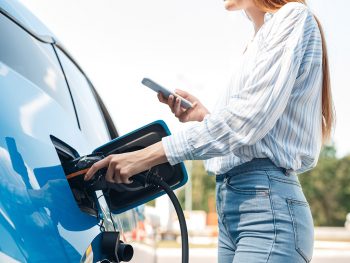Battery health concerns are number one barrier for used electric vehicle buyers
Assurances on the health of second-hand EV batteries could dramatically increase electric vehicle take-up, helping to fast-track the UK’s EV transition by more than a decade.

The Government is exploring plans to make battery state of health monitors compulsory on all new EVs
While some 61% of drivers say they would purchase an EV, over a quarter of them would not buy a used EV unless concerns are addressed, new analysis from the Green Finance Institute (GFI) has found.
Battery health is chief among such concerns, cited by 62% of drivers who wouldn’t buy a used EV. This makes it the number one barrier by far, followed by cost and charging infrastructure, according research among 2,000+ UK drivers for the Used EV Market: The Key to Unlocking Net Zero report.
The GFI, which involved 35 leading car dealerships, motor finance lenders and lease companies in its analysis, said assurances on the health of second-hand EV batteries would be the single most effective solution to encourage drivers to make the switch to electric vehicles, significantly accelerating the transition to net zero in road transport.
The Government has said it recognises the importance of the second-hand market to the transition to zero-emission vehicles. It’s convened a working group to identify potential barriers and solutions to the take-up of used EVs and also announced plans to make battery state of health (SOH) monitors compulsory on all new electric vehicles, helping to support consumer confidence.
The GFI report presents some of the conclusions from the finance and data workstream of the working group, which will be used by institute to support its collaborative work with government to develop the second-hand vehicle market.
Lauren Pamma, programme director at the GFI, warned that the EV transition was “destined to stall” without the used market onboard.
Pamma elaborated: “82% of car sales in 2021 were second-hand in the UK. So, if we’re serious about driving EV adoption en masse, we need to channel this appetite for second-hand cars towards EVs. Our research makes clear that the demand for EVs is already there, but to unlock the used market, we need to boost consumer confidence on battery health, charging infrastructure, and affordability. In collaboration with the public and private sectors, the Green Finance Institute is already working to implement solutions that tackle these barriers.”
Such solutions include Battery Health Certificates (a standardised battery health certification scheme for used vehicles) and Battery Value Guarantees (a mechanism for EV batteries to have a guaranteed end-of-life value).
These were most commonly identified by drivers as solutions that would encourage them to make the switch to electric, at 31% and 30% respectively.
Earlier this year, the UK remarketing sector called for a standard battery check for used EVs to accelerate buyer confidence. More than two-thirds (70%) of VRA members say it’s a key issue that needs resolving. The BVRLA is also exploring ways of promoting greater confidence in the used electric vehicle market. Its recent ‘Battery Health Deep Dive’ event brought battery experts together to explore ways of promoting greater confidence in the used electric vehicle market. One large piece of research shared suggested that average battery degradation across a range of EVs stood at under 2% per year.
The GFI research also found battery passports would give second-hand buyers accurate knowledge of their prospective battery’s life to date, and would also help allay concerns over batteries.O
Other ways of promoting used buyer confidence in EVs include agreed definitions and standardisation of metrics for Total Cost of Ownership Calculators – painting a clear picture of the total lifetime costs of EVs compared to ICE cars.
The GFI has also called for action to address information gaps, including on the cost and location of public charge points as well as energy tariffs, equalised rates of VAT on public charging (20) and home charging (5%), and combined monthly finance packages inclusive of both vehicle and home charging.
The research also indicated that dealerships are best placed to address gaps in consumer education as they’re the most trusted source of information on EVs (27%), bar personal research and family/friends. But dealerships are also in need of more information on EVs; just two out of the 21 involved in the research felt they had enough data on battery degradation, with the remaining in need of more information.
The full GSI report can be read/downloaded here.

